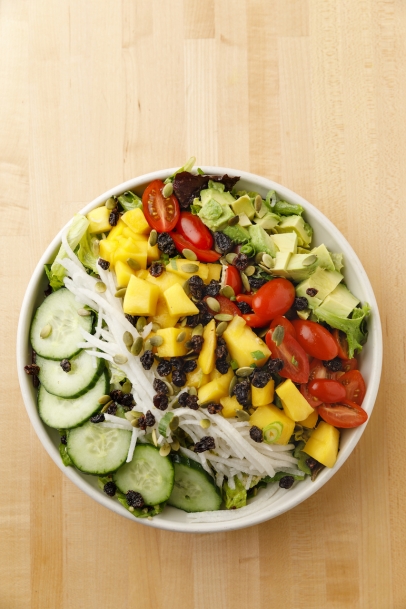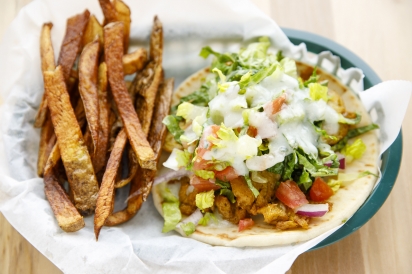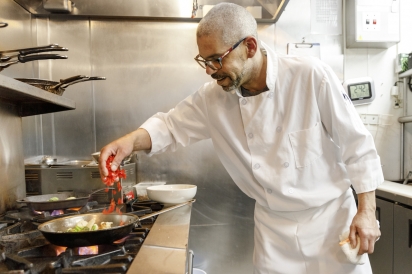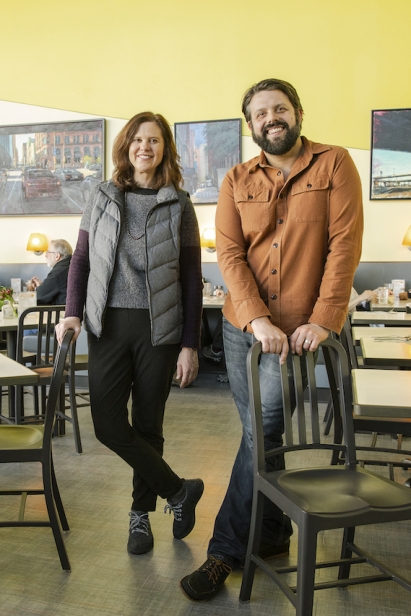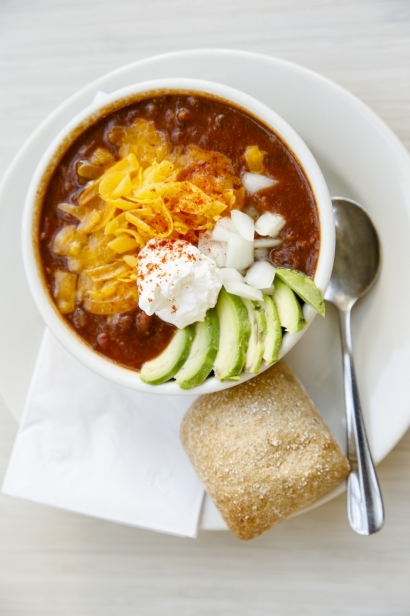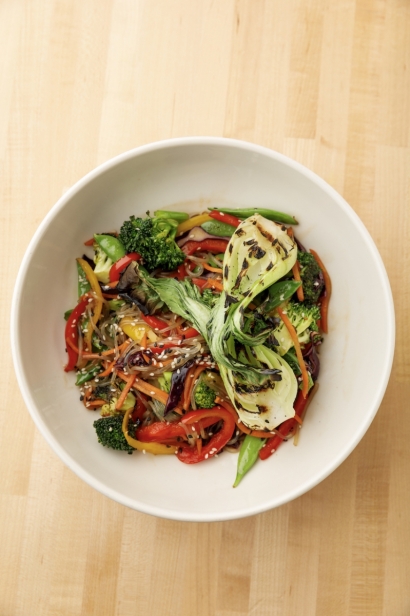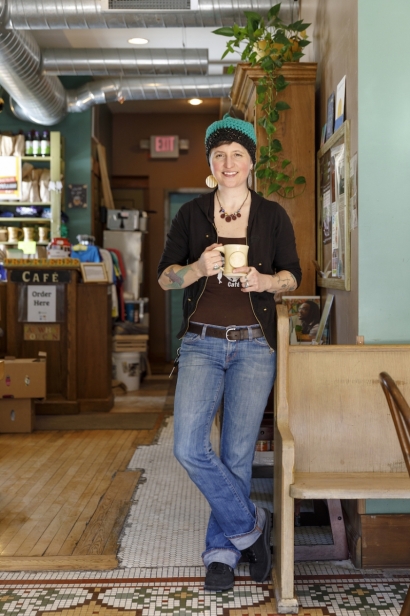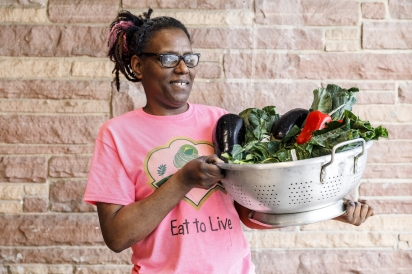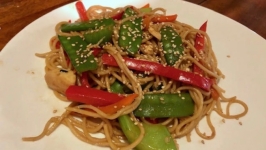Meatless in Milwaukee
How did a city built on burgers and brats develop a thriving vegetarian and vegan food scene? It began with artists and musicians, grew to include the health conscious and is now embraced by families, hipsters and of course, foodies. All of these groups, and the restaurants that serve them, understand the most important rule: meatless food can and should be flavorful and delicious.
Andrew Noble, who owns We Buy Records in Riverwest and co-owns Strange Town vegan restaurant on Prospect Avenue, points to Milwaukee’s East Side as the birthplace of the Milwaukee vegetarian movement, “You had vegetarian food started from the hippie co-op world represented by Beans & Barley, and then there were the ethnic restaurants that had vegetarianism contained within their cuisine. To this day, they’re colliding with each other to become the modern vegetarian culture which is going to be a blend of those two.” If the East Side was the vegetarian birthplace, Beans & Barley was its cradle. Lynn Sbonik was there, almost from the beginning. After graduating from the University of Wisconsin-Milwaukee in 1971 with a degree in weaving and painting, Sbonik went to work at Beans & Barley a few years later and in 1979, became a co-owner of the hottest spot in town.
“Beans & Barley was an East Side gathering place where people came together. Mike Stevens (the original owner) was working at Fertile Dirt, a cooperative vegetarian restaurant, but he was starting a family and needed more than a cooperative venture… so he started Beans & Barley and part of that vegetarianism came into the business,” Sbonik recalls. The waves of change in America had a huge impact on every aspect of life, especially food. “In the late 60’s and early 70’s, there was change in the way people looked at food production… this is after World War II when food production became a big deal, that whole movement affected how younger people were thinking about the way they were eating. There was the bulk food movement, there was the backto-the-land movement and people were growing their own stuff. Lots of people gravitated to cooking their own food, tofu started coming in, it was a big new thing. I saw yogurt for the first time at Beans in 1974,” Sbonik adds.
The local music scene on the East Side contributed to the growth of the vegetarian/vegan movement, as Noble explains, “By the time you get to the early 90’s when I went vegan, there was a subcultural influence: the punk shows and dance clubs and the hardcore music scene had huge subsections that were crossed with being vegan. There was a lot of intersection between underground music and veganism.”
Jim Neumeyer, current co-owner of Beans & Barley, agrees, “I lived on the East Side for my college years. I went to UWM and studied sociology. During school, I was playing music in bands and working. A bunch of musicians, politically minded and art people would be at the same venues on the East Side, in places like The Globe, Mad Planet and in different basement shows in Riverwest.” Beans & Barley became a go-to destination for visiting celebrities and musicians. Sbonik adds, “For a long time we were the only vegetarian restaurant… now there are a lot of them and times have changed, but we were fortunate to be doing something that no one else was doing… because we had that label of being vegetarian, we would get famous people.” Alanis Morissette, Halle Berry and Erykah Badu are just a few of the many performers who enjoyed a meal at Beans & Barley.
It took three decades for a dedicated vegetarian/vegan restaurant to open in the Western suburbs. Robin Kasch was motivated by her own dining experience to open Café Manna in 2008, “I believed that if I, being vegetarian at the time, was always looking for a place to eat healthier food, others were probably looking too.”
Even in 2008, selling the vegan concept had its obstacles. “My early challenges were finding qualified staff that were passionate about this kind of cooking and educating the public about how delicious, satisfying and filling this type of food truly is. Some people thought they would have to go to McDonald’s after a meal here,” Kasch says.
Sbonik agrees, “When we started serving vegan food it had to be good enough that everybody would want to eat it. We were careful not to change our standards of what we thought was good, like the key lime pie. People say it’s the best key lime pie in town, we didn’t want to make vegan food just to say it was vegan food.”
But what a difference a decade makes, today we have a myriad of options from casual, to high end, and a relatively new player in the vegetarian dining game, Tricklebee Café. This “pay whatever you want” dining spot is owned and operated by Christie Melby-Gibbons, a Pastor with a passion for feeding underserved populations.
Melby-Gibbons found that bringing vegetarian dining to Milwaukee’s inner city was a challenge, “People come in and look at the menu and say, ‘Oh, I don’t eat vegan food.’ We’ll say, ‘Just try it.’ They try it and love it and it’s literally the first time they’ve ever eaten a meal without animal products.”
A minister in the Morovian church, Melby-Gibbons also found that the payment model throws people off more than the menu. “Neighbors are LOVING having a health food spot right in the neighborhood, folks come and say, ‘I’m gonna come here two or three times a week as part of my endeavor to be a healthier person.’ People are saying they’re losing weight, they’re not needing some of the meds they’ve been on for diabetes or high blood pressure. It’s been fun to hear people’s stories,” she adds.
Anah Lesure, founder and owner of Next Level Vegans restaurant at the Sherman Phoenix is impressed with the way our community has embraced meat substitutes. “They. Love. It. Even meat eaters love it, they say ‘Are you sure this isn’t meat?’ I make the steak gyros with seitan and it’s all about the seasonings.” Lesure is encouraged by the growth of the vegan movement in Milwaukee. “The vegan community is doing more vegan festivals and I’d like to see even more vegan events where people come together… veganism in Milwaukee in the last six years has expanded and grown and it’s still growing.”
VeganMilwaukee.com is a resource for the local vegan/vegetarian community. Colleen and Ricky Bielski run the site to provide information about vegan dining and activism. “We’re kind of a hub for getting the message out but we don’t actually organize. We promote and advertise in every way we can.” Colleen Bielski is excited about the current state of vegan Milwaukee, “The demand for vegan anything is growing rapidly… in the past four or five years, the vegan culture has grown a lot. We have five vegan restaurants and several all vegetarian restaurants. Whatever way someone wants to get involved in that kind of lifestyle, whether its food based or activism based, it’s here,” Bielski adds.
Beans & Barley co-owner Jim Neumeyer agrees, “People are into a plant based diet more than ever before, they know it’s a healthy and great way to eat. You don’t have to compromise your health or nutrition at all. People of all ages now eat plant based diets for sure. Across the board that demographic is broadening, it’s shed a lot of the old school stuff.” Neumeyer is optimistic about the future of vegetarian/vegan Milwaukee. “It’s still Milwaukee, but local diners are willing and able to get behind plant based. There’s still meat and potatoes and beer but there’s plenty of broccoli and tofu as well.”


